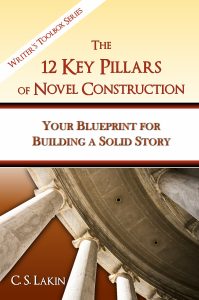Mastering Outlining Your Novel
Over the past few months, I’ve had hundreds of my blog followers and newsletter subscribers fill out my survey. On the survey I ask what issues they’re struggling with. What blog posts they’d like to see (and books I should write). While I haven’t gotten through every survey to date, some topics run ubiquitously through these survey responses.
I want to take a look at the top 20 or so, and throughout the year, on Thursdays, I’ll be addressing these. Suffice it to say, many requested topics are ones I’ve covered extensively on my blog. Which tells me a few things:
- My readers aren’t aware they can search the blog for past posts. You can. And should! There are hundreds of thousands of words written and published on Live Write Thrive. I’ve spent hundreds of hours writing these posts, and the sheer amount of content, if words could be transformed into grains of sand, would be so heavy, I doubt even Hercules could lift the sack. While I often revisit topics from time to time, it’s usually to share a new insight or take on the matter. So, if you need help on some bit of craft or how to survive the writing life, do a search in that plain-old search bar on the top right side of my blog. Then read up!
- Or my readers have read all they can get on the topic (from my blog and craft books) and still want more. And that’s great. I’ll give more. That’s why I’m here—to keep it coming.
- Or my readers have read it all and just don’t get it. Whatever it is. I know how that feels. Sometimes it just takes time. If you’re a beginning writer and you’re facing a mountain of a climb to get to the top just to be able to outline a novel or write succinctly, you need to be patient and just work on one key skill at a time.
I’m so glad to hear from you. I want to provide the content you need, when you need it. Your feedback gives me lots of ideas, and I’m reaching out to industry professionals to guest post on some of those topics (in which they’re experts in).
So let’s take a look at the first of twenty requested topics (and I’m not doing this in any specific order).
Help with Outlining
Seeing as I spent months on this topic, it got me scratching my head. I’ve probably posted twenty to fifty posts in the last year that touched on outlining,
I’m big on outlining, as many of you know. I think it’s crucial to outline your novel before you tackle writing it. And of the hundreds of novels I critique and edit each year, very few are well structured. Very few need only a slight amount of reworking. Very few have solid plots with scenes in the right places.
Maybe some of those writers did outline their novel. But here’s the thing: if you don’t understand how a novel is structured—and I’m talking very basic here—then your outline is going to suck. Sorry, but that’s the truth. That’s why I spent months going over the ten key scenes you need in your novel. I’m going to give you a list of some of those posts, as well as the chart to download, so you can get this outlining thing started the right way.
I say this a lot: structure is key. The best writing instructors agree that novels follow a basic structure. And this story structure applies to movies and plays as well. Readers and viewers are accustomed to structure. So while you can break the rules, it is best to learn them and follow them until you nail them. Don’t go with that adage “Rules are meant to be broken” until you’re an expert on the topic.
One person wrote in their survey response: “I need help outlining. I’m having trouble defining and concentrating on a definite problem that I can blossom into a full work.” Another wrote: “I need help refining my idea/plans for a novel so that I can begin outlining and writing.”
 Listen, before you can dig into that outline, you have to work on those pillars of novel construction. You need to come up with a concept with a kicker: an original, fresh, riveting idea. Sure, there are no new ideas out there. But you can take an old idea and give it new life with originality.
Listen, before you can dig into that outline, you have to work on those pillars of novel construction. You need to come up with a concept with a kicker: an original, fresh, riveting idea. Sure, there are no new ideas out there. But you can take an old idea and give it new life with originality.
I’ve said this perhaps a hundred times: if you start with a weak, boring concept, it’s going to be near impossible to write a great novel based on that foundation. Hear me clearly on this. Too many writers waste months of their lives writing boring novels. Don’t go there. Don’t start writing until you’re sure you have a killer concept. You’ll disappoint yourself and any reader chancing upon your book.
I wrote lots of blog posts on this, and then put together the book The 12 Key Pillars of Novel Construction. And then created an online video mini course on the four corner pillars. You can’t make excuses for not learning this stuff. Many writers have emailed me to say thanks for all this material because it’s exactly what they needed and couldn’t find anywhere else.
And that’s just the concept.
If you’re floundering at this early stage of your novel development, first nail those pillars. Once you have clear your concept, protagonist and goal, conflict and high stakes, theme, secondary characters and subplots—all that stuff—you can begin to lay out that outline using my template and charts. I’ve made it as easy as possible.
While I’ll get into this topic further next week, for now, if you’re struggling with outlining, and you’ve already gotten all your novel components strongly in hand, read or reread these posts, and then download my charts and templates and get to work!
These are just a few of the posts on the topic, so if you’re in need of going deep here, read them all. They ran every Monday for most of 2016.
Here are some of the charts you can download:
The 10-Key Foundational Scenes (PDF)
10 Key Foundational Scenes (Excel Chart)
Check out my resource page for other freebies that will help you with all this.
What specific issue do you have with outlining your novel? What resource (book, chart, post, etc.) has helped you the most? Share in the comments.












I am so happy to find such an extensive blog post on outlining a novel. I am starting my first, after years of slogging through writing a memoir and deciding not to publish for personal reasons. Other work has also been in the nonfiction genre.
Thanks you for your efforts on behalf of other writers and your encouragement and support.